Commonweal’s communication manager, Kyra Epstein, speaks with Rachel Naomi Remen, MD, Medical Director of the Commonweal Cancer Help Program and founder of the Institute for the Study of Health and Illness at Commonweal.
Kyra: Your grandfather, who was an Orthodox rabbi, seems very present in your writing and your stories. I feel like I know him a little. I’m curious about what your grandfather would have thought about your life’s work.
Rachel: My grandfather was a man of another generation, actually another world. He would not have understood the whole concept of “life work.” Grandpa was a mystic, a student of Kabbalah. He thought of things in older ways, according the ancient teachings of Judaism. For him life was not about “work” but about a purpose that is greater than our work and may have little or nothing to do with our daily work. My grandfather believed that each of us has a holy purpose and that we fulfill this purpose in many ways—through our relationships, our families, our careers, or just on some street corner somewhere. We may fulfill our life purpose simply by something we say to some stranger on a bus.

There is an old wisdom story that is told at the time of Rosh Hashanna, the beginning of the Jewish New Year. It’s called The Birthday of the World and it goes like this: in the Beginning there was only the Holy Darkness, the source of life. And then, some time in the history of things, the world as we know it, the world of a thousand thousand things emerges as a ray of light from the heart of the Holy Darkness. And then, perhaps because this is a Jewish story, there is an accident and the vessels containing the wholeness of the world break open and the wholeness of the world is scattered into billions and billions of sparks of light and wholeness. These sparks of wholeness fall into all things, all people, all institutions, all organizations where they remain deeply hidden until this very day.
The whole human race is a response to this accident. We each were born with the capacity to discern the hidden wholeness in all things, all people, all events and institutions. We can nurture it and strengthen it, we can lift it up and make it visible once again and thereby we can restore the world back into its original wholeness. This is a collective task involving all the people who have ever lived, all the people presently alive, and all the people yet to come. We are able to do this not because we are doctors or artists or writers but simply because we are human beings. So we share a collective purpose: we were born to restore the wholeness of the world. You might say that no matter what our “life work” is, we all have a single work.
K: What a beautiful story.
R: You know, the collective purpose has a Hebrew name: Tikkun Olam, which translates as the word “service.”
K: Is there anything else written about this?
R: Yes and I love it. One of my favorite authors, Kurt Vonnegut, writes about this in his book Cat’s Cradle. According to Vonnegut, God has organized the world into working units called Karasses. A Karass is a group of people who have been born to serve one of God’s holy purposes without ever knowing. Their lives and their work may bear no outward relationship to one another. No matter. They serve their holy purpose together perfectly. Vonnegut says that the members of a Karass circle around their holy purpose like electrons circle the nucleus of an atom. Some orbit very close to the nucleus. Others orbit at a great distance. But all are bound to the their holy purpose by spiritual bonds, bonds of the soul. Those who orbit very close to the nucleus may be friends or even a married couple. But most others are total strangers: people whose lives and work seem to bear no relationship to one another, people of all ages who speak different languages and have different religions, people who will never meet or have any awareness of one another. Yet their lives fit together perfectly in service to their holy purpose. Vonnegut contrasts this to the Grandfaloon, the way human beings organize the world. The people in a Grandfaloon think they are related to one another but actually have no relationship to one another at all; for example, the Yale class of 2003 or any professional sports team anywhere.
K: And the people in a Karass don’t ever know who each other are or even know what the holy purpose they serve together perfectly is?
R: Not exactly. According to Vonnegut, should you have the good fortune to meet a member of your Karass, you feel a sort of deep recognition that you cannot explain, a sense of bondedness, a feeling that this other person is truly family.
K: Like Commonweal?
R: Yes. Just like Commonweal.